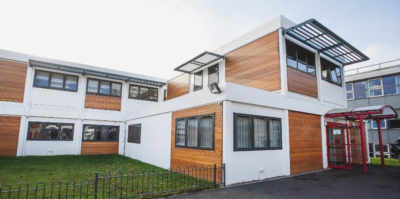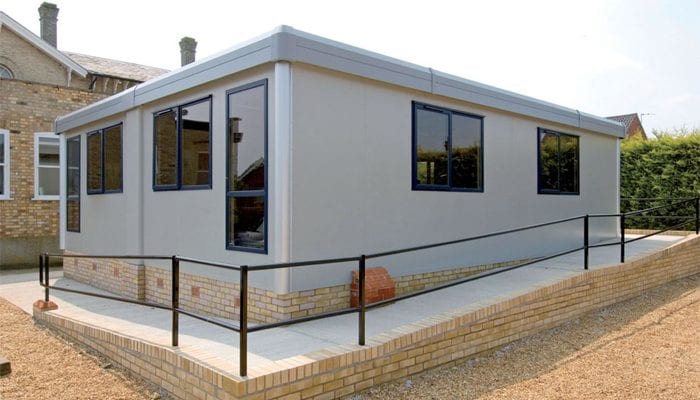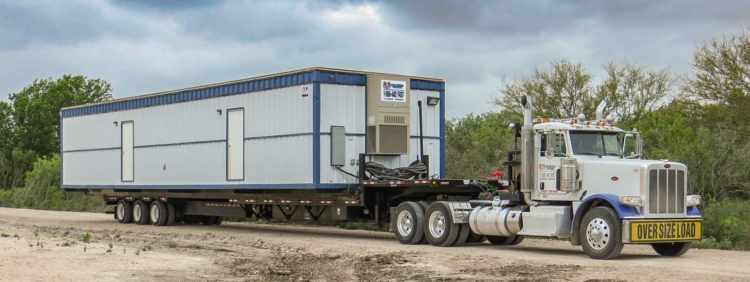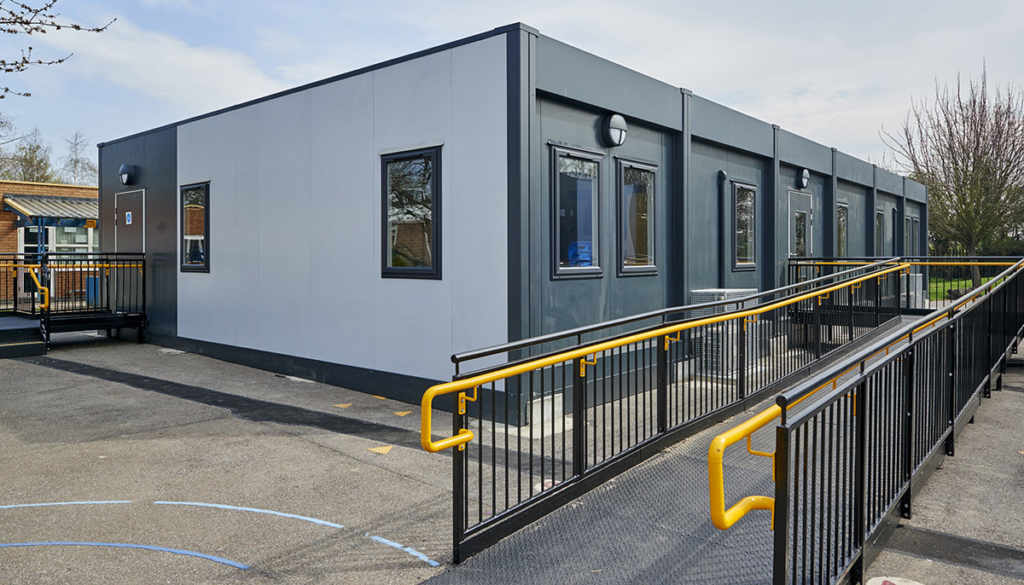What Are Modular Building Units? Here’s Your Ultimate Guide
Modular building units are the way of the future when it comes to cheap, temporary construction. But what are modular units, exactly?
You’ve seen them at schools, you’ve seen them turned into tiny houses, and now businesses are foregoing expensive office spaces for modular units.
But why? For starters, commercial real estate prices continue to rise nationally.
With the price of doing business in the U.S. climbing, savvy business owners are cutting the cord with real estate and turning to portable units instead.
We’re going to fill you in on everything you need to know when it comes to switching to modular units so you can downsize your personal or professional life.
What Is a Modular Unit?
 Modular construction is a process where a building is manufactured off-site in a facility in individual pieces, then delivered and put together on-site. Modular units are built to the same codes and standards as conventional buildings but in less time and for less money.
Modular construction is a process where a building is manufactured off-site in a facility in individual pieces, then delivered and put together on-site. Modular units are built to the same codes and standards as conventional buildings but in less time and for less money.
Modular units may be growing increasingly popular but they’re more than a century old. By the time Sears Roebuck began offering build-a-kit homes in 1908, Australia had been using pre-fab construction for decades. Americans have been in love with them ever since.
There are two kinds of modular units: permanent modular construction and relocatable buildings.
Permanent modular construction (PMC) are exactly what they sound like: they’re units that are built in controlled plants in modular sections then permanently placed on-site for one use. Office buildings and even multi-family homes are a good example of a PMC in use.
Relocatable buildings, like PMCs, use a modular construction process but are intended to be re-purposed or reused many times at many different sites.
How Are They The Same as Traditional Construction?
Both modular and traditional buildings require the following construction processes:
- Design and engineering
- Permits and approvals
- Site development and foundations
But after this step, there is a definite separation between the two.

So, How Are They Different?
After the groundbreaking at the site is finished and the foundation is laid, things move a lot quicker in modular construction:
- Construction Begins at the Plant
- The modular unit is taken to the site and the pieces are fitted together
- Site is restored
- It’s move in time!
It’s that easy. The unit leaves the plant 95% constructed, leaving the only thing that needs to be completed putting the pieces together. After concrete is poured at the site and any landscaping is installed, the modular unit is ready to go!
On the other hand, traditional construction takes a lot longer and costs much more, starting with the site development and foundation process. This step takes longer because there’s more involved. While a traditional building is still in the site development stage, a modular unit is being delivered to its site
The on-site building is also a longer process because there are no pre-fab pieces; everything is built to permanently be in place. By the time a traditional building is ready for site restoration, the modular unit is already enjoying a tenant.
Because of the tightly controlled construction process, modular units produce less waste and create fewer disturbances to the site environment, making them greener than traditional construction!
Your first thought may have jumped to a trailer or mobile home, but there are many more innovative uses that are becoming increasingly popular…
 Modular Units in Schools
Modular Units in Schools
Funding for public schools has been declining across the country over the past decade. Depending on where you live in the U.S., your school district may have cut back on the arts, books, hiring full-time teachers, or expanding the buildings themselves.
When the latter happens, schools turn to modular construction to handle increased class sizes. Approximately 300,000 modular units, often called relocatable classrooms, are in use in the U.S. today.
Recreational and Residential Uses
You’re already familiar with modular construction used for residential buildings like trailers and mobile homes. You’ve probably even noticed the “tiny house” trend on cable TV. But what about greenhouses? Guesthouses? Pools?
Yes, you read that correctly, shipping containers are being used as above-ground pools!
A standard shipping container is 8-feet tall, which makes an above-average depth for your above-ground pool. You’ll have to put some time and effort into it to prevent rust and leaks, but once it’s finished, you’ll have your own backyard oasis.
Best of all, modular units are completely customizable! You choose the color, the interior features, the windows, even the roof and the manufacturer will build your unit to your specifications.
Construction Sites
It’s kind of ironic when you think that construction companies are using modular units on job sites where traditional buildings are being built, isn’t it?
Companies are purchasing or renting a shipping container or relocatable building and using it as an on-site office. This saves overhead costs on insurance and spending money on office space leases that aren’t in use.
By renting a unit, a company has the option to pay for only what they use and need.
 Office Spaces
Office Spaces
The trend in many startups and small businesses these days is to forego the lofty expenses that come with signing a year-long lease with a property manager. Many cities are offering co-work space or collaborative workspaces to fill the need of smaller companies that don’t have a lot of employees.
Co-work spaces are budget-friendly options for small business owners, freelancers, and individual professionals just starting out. But so are modular units.
Whether it’s renting a mod in a PMC or converting a relocatable building like a shipping container or other portable unit, modular units are becoming popular for the privacy factor. At a co-work, you have no control over who’s sitting at the table with you or who’s taking a business call while you’re trying to look over reports.
With a modular unit, you have the convenience of saving overhead costs while still working in a quiet environment that allows you and your employees to be efficient and productive.
If You’re Looking For A Modular Unit, You’ve Come to the Right Place
It’s easy to lose track of all of the uses for modular units, especially when it comes to business. We specialize in knowing the ins and outs of modular construction, so we can answer your questions thoroughly.
Regardless of whether you’re looking for a unit to house your office, construction business, or your family, our quick quote form will get you started on your way.


 Modular Units in Schools
Modular Units in Schools Office Spaces
Office Spaces